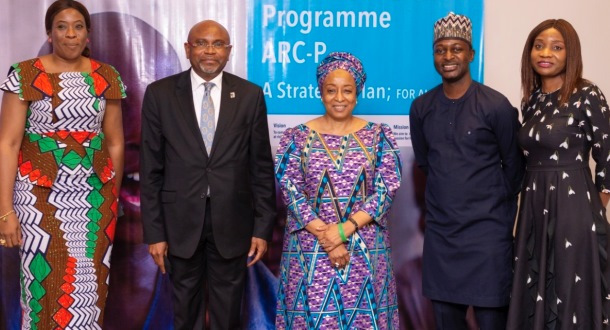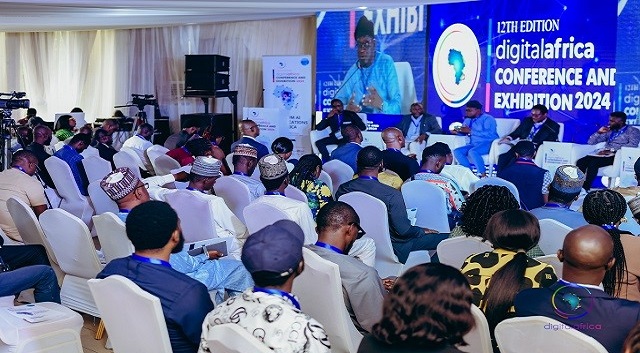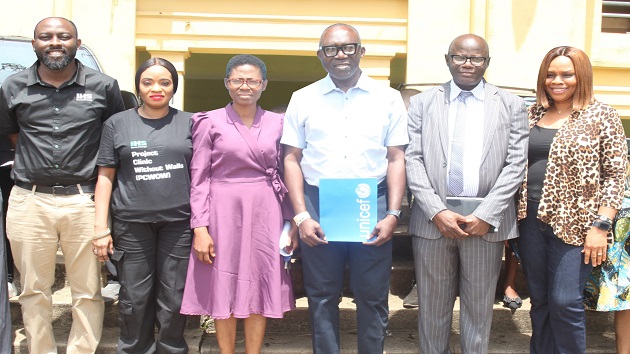General News
ARC-P Pledges to Protect Over 9m Unprotected Nigerian Children

The At-Risk Children Project (ARC-P) will offer protection to the over nine million unprotected children in the country who deal daily with violence, abuse, neglect, exploitation and exclusion, the Special Adviser to the President on Social Investments, Mrs Maryam Uwais, has said.

Mrs Uwais said this recently while unveiling the programme, a strategic national response to address the problem of vulnerable children coordinated by her office to the Organised Private Sector (OPS) in Lagos.
The Special Adviser explained that ARC-P’s vision is to comprehensively address cross-cutting concerns of at-risk children and provide them with a life of dignity.
“In the family and communities, children should be fully protected so they can survive, grow, learn and develop to their fullest potential,” she said.
The project’s mission, Uwais added, “is to facilitate programmes that will ensure the integration of at-risk children and young adults by creating opportunities for skills and empowerment to reduce their vulnerabilities.”
She further disclosed that ARC-P would nurture children with dignity and respect, raise equality citizens and bridge the poverty gap.
“A key objective of the program will provide protection and hope to youth and children who are vulnerable, for a productive life through learning, combined with improved health outcomes, values and skills. It will also provide meaningful, impactful and pragmatic quality programs that empower the children to become productive to themselves, their families, communities and society,” Uwais said.
The programme, she further disclosed, would “leverage on successful tried and tested intensive learning initiatives. Expand, deepen and broaden the scope of other programmes on the ground. Coordinate, add value and set basic standards through trained facilitators within the State for sustainability.
“In addition to the existing learning options, literacy and numeracy, introducing civics, critical thinking, life skills, entrepreneurship, sports, creativity, technology, farming and vocations, community police training. Address mental and physical health concerns, assess and address vision, hearing and special needs, boost nutrition through a feeding programme.”
She disclosed that the programme would be institutionalised to continue beyond the President Muhammadu Buhari administration and called for support from Corporate Nigeria to implement interventions including basic literacy and numeracy, health and nutrition, entrepreneurial, financial literacy and vocational skills and digital skills.
Uwais said they could sponsor any of the programmes and assured that all monies would be accounted for because good corporate governance is a core of ARC-P.
Responding, some of the companies, including Lafarge Africa Plc, ANAP Holdings, Airtel Nigeria, International Finance Corporation, Flour Mills of Nigeria, Wema Bank, Aliko Dangote Foundation, FBN Quest Trustees, StanbicIBTC, InterSwitch, Murtala Muhammed Foundation and Accelerex Network, all commended the initiative.
They noted that it was an innovation that would help resolve the out-of-school children problem and insecurity.
“This is an outstanding innovation. I’ve been doing this for about seven years, and I’ve never really thought about getting the kids off the street. We do education, but we never looked at it from this angle, so I think this is commendable,” Chioma Okolie, head, Corporate Social Responsibility, Airtel Nigeria, said.
Femi Akinfolarin, head, Corporate Strategy, Wema Bank, affirmed the same. He said, “This is the single largest problem in Nigeria. Unemployment and these youths coming out without skills, without being able to do anything. So, it’s top of mind right now. We need to position this initiative as a solution to an evolving problem and thus create an urgency that will make the government and private sector accelerate their reaction to what’s going on.”
They also advised on strengthening the initiative for maximum impact while seeking clarifications from both Mrs Uwais and officials of FBN Quest Trustees, the project’s fund managers.
The At-Risk Children Project is domiciled in the Office of the Special Adviser to the President on Social Investment. It reports directly to the National Steering Committee of the National Poverty Reduction with Growth Strategy (NPRGS), chaired by Vice President Yemi Osinbajo.
General News
OpenAI Unveils New AI Agent for Software Developers

OpenAI has launched Codex, which it regards as its most capable AI coding agent available to ChatGPT Pro, Enterprise, and Team subscribers.

Users will have ‘generous access at no additional cost’ for a few weeks, after which OpenAI plans to introduce pricing options and rate-limited access.
Codex, a cloud-based software engineering agent, can write features, answer questions about a codebase, fix bugs, and propose pull requests for review. Several tasks can run simultaneously, and users retain full access to their computers while the agent takes anywhere from one to 30 minutes to complete a task.
The research preview of Codex offers powerful code-writing, debugging, and collaboration features, which mark a major step in OpenAI’s push to automate software development.
“We imagine a future where developers drive the work they want to own and delegate the rest to agents—moving faster and being more productive with AI,” OpenAI said.
Since it is still in research preview, the tool remains in early development. “It currently lacks features like image inputs for front-end work, and the ability to course-correct the agent while it’s working,” the firm said in a blog post.
Additionally, delegating to a remote agent takes longer than interactive editing, which can take some getting used to, it stated. Over time, however, the company said using the service will feel more like asynchronous collaboration with colleagues.
The launch comes as part of a broader rise of AI tools for software engineers that are meant to handle repetitive, boring tasks rather than take over the whole gamut.
OpenAI is reportedly in talks to acquire Windsurf, a maker of AI coding tools, for around $3 billion, which is potentially its largest acquisition to date.
General News
Africa Gears Up For Digital Sovereignty At 13th Edition Of Digital Africa Conference 2025

Africa’s digital destiny will on October 28-29, 2025, take centre stage at the 13th Edition of the Digital Africa Conference & Exhibition (DACE), to be held at Merit House, Abuja, under the theme: “Sovereign Intelligence: Africa’s Voice in the Global Digital Order.”

At a time when artificial intelligence (AI), smart systems, and data technologies are reshaping societies, economies, and governance structures worldwide, DACE 2025 is sounding a clarion call: ‘Africa must lead, not lag in this transformation.’
Organizers say the aim is to move beyond consumption and dependency, and instead position the continent as a proactive contributor to global digital norms and governance.
“This year’s conference is about shifting from passive adoption to active leadership,” said Dr. Evans Woherem, Chairman, Digital Africa Consult, organisers of the event. “Sovereign Intelligence is more than a concept, it’s a movement to ensure that Africa controls its digital resources, designs its own ethical frameworks, and asserts its voice in shaping global technology norms.”
A Defining Moment for Africa’s Digital Future
Woherem said the conference will serve as a high-level, cross-sectoral platform aimed at positioning Africa as a co-author of global AI governance standards, rather than a mere recipient, assuring that the conversations are expected to align closely with the African Union’s Continental AI Strategy, advocating for a united, self-determined digital ecosystem across the continent.
“The urgency of this moment cannot be overstated. As the world builds its digital infrastructure, much of the technology consumed in Africa is still imported, foreign-owned, and culturally disconnected. African data is often stored offshore, local languages and cultural contexts remain invisible in AI systems, and African experts are frequently excluded from global decision-making tables.
“This must change. Digital Africa 2025 is about taking control of our data, our narratives, and our technological development. Africa must move from being users of foreign systems to creators of our own,” Woherem added.
Key Objectives of DACE 2025
One of the primary objectives of this year’s event is to advocate for African ownership of digital infrastructure, data policies, and technology standards. Organizers hope to inspire African leaders and institutions to say yes to innovation and regulation built by Africans, for Africans.
Another major focus will be amplifying African voices on the global stage. This involves not only advocating for inclusion in international policy dialogues but also ensuring that African values, cultures, and wisdom shape the design and deployment of AI systems worldwide.
“The conference will also spotlight homegrown innovation. Startups and developers from across the continent will showcase digital solutions addressing local challenges in healthcare, agriculture, finance, and education. These practical examples will reinforce the message that Africa is already generating intelligent, scalable answers to complex problems,” said Nneoma Ofodile, General Manager, Digital Africa.
Empowering young Africans through digital skills, research opportunities, and leadership training is another key goal of the gathering. Organizers are committed to fostering a new generation of African tech leaders who can confidently shape global digital trends from a place of knowledge and ownership.
Regional cooperation will be front and centre, as DACE encourages cross-border collaboration on harmonizing laws, sharing infrastructure, and building integrated digital ecosystems. Sessions will explore how African nations can jointly develop policies and platforms that reflect the continent’s unique needs and aspirations.
While global partnerships will also be on the agenda, the conference aims to deepen Africa’s engagement with international institutions such as UNESCO, the UN, and the OECD, not as passive participants but as co-authors of global standards for ethical and inclusive AI.
Nneoma said that throughout the two-day event, attendees can expect high-level discussions on digital law, tech sovereignty, and innovation policy, alongside practical workshops for developers, educators, and youth. Innovation showcases will highlight the work of African tech hubs, while strategy sessions will promote cross-country digital alignment.
At the close of the event, a concrete roadmap is expected to emerge—outlining actionable steps toward achieving digital sovereignty across the continent. The conference will also aim to strengthen networks among African innovators, regulators, and thinkers, while increasing the visibility of African insights in international technology policy.
Above all, Digital Africa 2025 is about reclaiming agency. “This isn’t just a technology conversation,” Nneoma emphasized. “It’s about power, voice, and independence. Africa must not only catch up; Africa must lead.”
As preparations intensify, DACE 2025 is inviting visionary organizations, sponsors, and partners to join the mission of building a digitally sovereign and inclusive Africa.
General News
IHS Nigeria, UNICEF Assess Impact of their Lifesaving Oxygen Plant Donated to Oyo State

IHS Nigeria, part of the IHS Holding Limited (“IHS Towers”) group, one of the largest independent owners, operators, and developers of shared communications infrastructure in the world by tower count, has continued its impact assessment tour of its oxygen plant projects situated in different hospitals across the country.

The telecommunications infrastructure company visited Jericho Specialist Hospital, Ibadan, Oyo State on Wednesday, June 18, 2025, to assess the usage condition of the oxygen plant jointly donated in collaboration with the United Nations Children’s Fund (UNICEF) in May 2024.
The oxygen plant donation is part of IHS Nigeria’s commitment to improving Nigeria’s healthcare system through sustainable, impactful initiatives designed to serve health facilities in the state.
Ahead of a tour of the facility, the IHS and UNICEF team were received at the Oyo State Ministry of Health by the Honorable Commissioner for Health, Dr. Oluwaserimi Adewunmi Ajetunmobi alongside the Permanent Secretary and other Directors from the Ministry and the Oyo State Hospital Management Board.
The visit, led by senior officials from IHS Nigeria and UNICEF, provided an opportunity to evaluate the plant’s operational efficiency, its integration into critical care delivery, and its broader impact on the state’s healthcare system.
Commenting on the visit, Titilope Oguntuga, Director, Sustainability, IHS Nigeria remarked: “At IHS, sustainability is at the core of everything we do. Our focus spans four key pillars which are Ethics & Governance, Environment & Climate Change, People & Communities and Education & Economic Growth.
This oxygen plant initiative speaks directly to our commitment to people and communities. As we assess the progress of this project, we are reminded of its alignment with key Sustainable Development Goals, including good health and well-being, responsible consumption, and partnerships for the attainment of the SDG goals.”
“We are here not just to inspect the plant, but to witness the impact, strengthen relationships, and continue building a partnership that delivers real value to Nigerians.” She added.
Health Specialist, UNICEF Lagos, Dr. Olufemi Adeyemi commented: “It is a pleasure to witness the results of our strong collaboration with IHS Nigeria and Oyo State. On behalf of UNICEF, I want to sincerely thank the state for providing an enabling environment that makes impactful partnerships like this possible.
“We are here to assess how well the oxygen plant is performing. We no longer want to see lives lost due to a lack of oxygen. We want to be assured that the investment made is truly saving lives and delivering the impact it was intended to.”
Commissioner of Health, Oyo State, Dr. Oluwaserimi Adewunmi Ajetunmobi expressed appreciation for the initiative, saying: “This partnership between IHS Nigeria and UNICEF is a testament to the power of collaboration in strengthening our healthcare system.
“The oxygen plant at Jericho Specialist Hospital has become a critical asset in our fight to reduce avoidable deaths, especially among newborns and vulnerable patients. It is not just a donation; it is a life-saving intervention that has redefined emergency response capabilities in the state.
“We commend IHS Nigeria and UNICEF for their foresight, dedication, and long-term commitment to healthcare delivery in Oyo State.”
Dr. Akintunde Ayinde, Permanent Secretary, Oyo State Ministry of Health commented on the significance of the oxygen plant and the broader impact of the partnership.
“Before COVID-19, oxygen therapy was not prioritized in most hospitals, government or private. But when the crisis hit, IHS Nigeria and UNICEF didn’t just donate equipment, they identified the gap and moved quickly to close it. This oxygen plant has completely transformed our emergency response system. We’ve gone from scarcity to stability. Patients who once struggled to access oxygen especially those who couldn’t afford it now receive it without delay’’.
“Beyond the donation, IHS and UNICEF brought us a sustainability model, trained engineers, and introduced a more efficient, solar-powered oxygen management system. We’re now extending oxygen access to primary and secondary care centers and even supplying private clinics in crisis. For me, this initiative is not just impactful, it is lifesaving. We are truly grateful and committed to building on this collaboration to ensure long-term impact.” He added.
The oxygen plant is equipped with 50 units of 6-cubic-meter cylinders and 150 units of 3 cubic meter cylinders that currently supplies both private and public hospitals including primary health centers all over Oyo state.
The hospital management acknowledged the difference the plant has made in ensuring prompt availability of oxygen even for primary healthcare centers that are unable to pay, and in improving the medical outcomes for many patients who need oxygen as part of their management.
Recall that earlier this year; the team had visited the Olabisi Onabanjo University Teaching Hospital (OOUTH), Sagamu, to evaluate the operational status and impact of the oxygen plant installed in Ogun.

 Telecom2 days ago
Telecom2 days agoLebara, New Operator Enters Nigerian Telecom Arena, Sells Minutes, Not Airtime

 E-Business2 days ago
E-Business2 days agoOver 7m Streaming Accounts’ Credentials were Leaked in 2024 – Report

 E-Financial2 days ago
E-Financial2 days agoFidelity Bank Uplifts Old People’s Home with Essential Items Donation

 E-Financial2 days ago
E-Financial2 days agoS&P Global Ratings Downgrades Ecobank Nigeria’s Credit Rating to CCC-, Outlook Negative

 Telecom2 days ago
Telecom2 days agoPIN Pushes for Equitable Digital Governance at World Internet Forum

 General News22 hours ago
General News22 hours agoOpenAI Unveils New AI Agent for Software Developers

 Telecom3 days ago
Telecom3 days agoMTN Says New N6.98 USSD Charge Won’t Affect Airtime Recharge

 Telecom22 hours ago
Telecom22 hours ago15 African Startups Using AI Selected for Google Accelerator Cohort 9




























